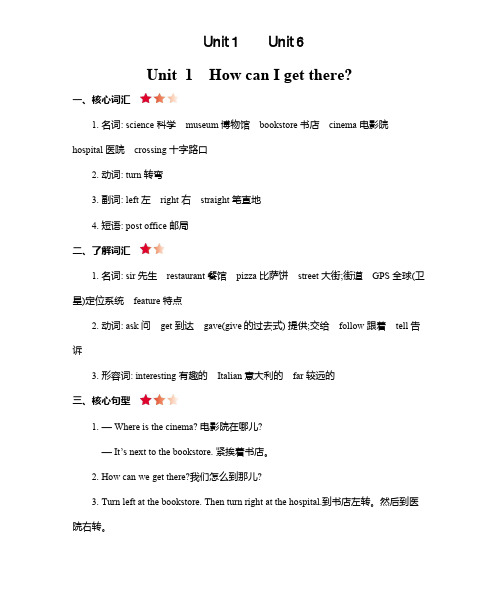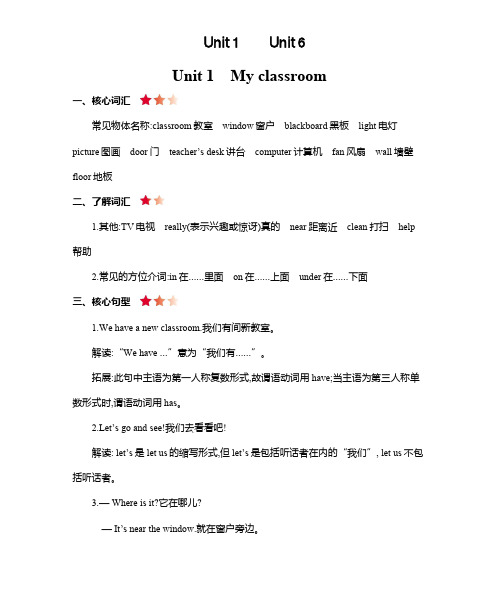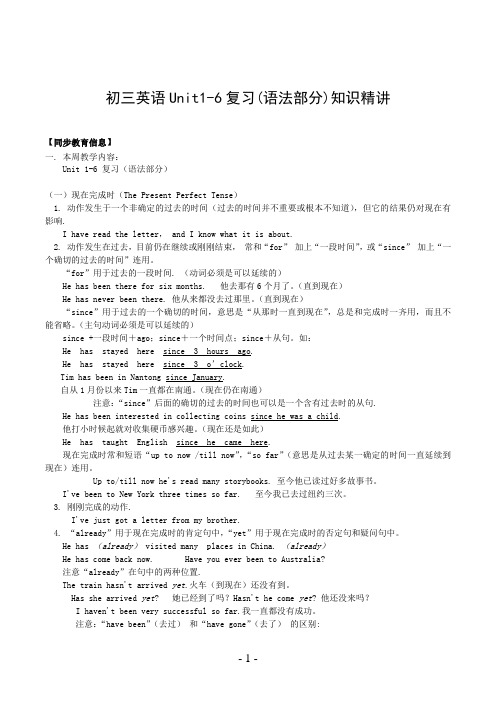Unit1-6复习要点(打印1份)
六年级英语Unit1——Unit6知识点汇总

六年级英语Unit1——Unit6知识点汇总Unit1How can I get there?一、核心词汇1.名词:science科学museum博物馆bookstore书店cinema电影院hospital医院crossing十字路口2.动词:turn转弯3.副词:left左right右straight笔直地4.短语:post office邮局二、了解词汇1.名词:sir先生restaurant餐馆pizza比萨饼street大街;街道GPS全球(卫星)定位系统feature特点2.动词:ask问get到达gave(give的过去式)提供;交给follow跟着tell告诉3.形容词:interesting有趣的Italian意大利的far较远的三、核心句型1.—Where is the cinema?电影院在哪儿?—It’s next to the bookstore.紧挨着书店。
2.How can we get there?我们怎么到那儿?3.Turn left at the bookstore.Then turn right at the hospital.到书店左转。
然后到医院右转。
注意:要注意介词的固定搭配。
Turn left/right at the…到……左/右转。
Get off at the…在……下车。
It’s on the left/right.在左/右边。
Walk/Go straight for…minutes.步行/直走……分钟。
It’s east/west/south/north of the…在……东/西/南/北边。
It’s far from the…距离……远。
四、了解句型1.Is there a…?……有……吗?拓展:there be句型(1)主要用以表达“某处(某时)有某人(某物)”,其基本句型为“There+be动词+名词+介词短语+其他.”There is a football under the chair.椅子下面有一个足球。
Unit1-Unit6重要知识点(素材)-六年级上册英语

六年级上册期末复习知识点(1-6单元)1、能认读归类,能拼写地点:science museum 科学博物馆post office 邮局bookstore 书店cinema 电影院hospital 医院交通:crossing 十字路口turn 转弯left 左边right 右边turn left 向左转turn right 向右转straight 笔直地go straight直走map 地图compass指南针GPS全球定位系统出行方式:on foot 步行by bus 坐公交车by taxi 坐出租车by plane坐飞机by ship坐船by subway坐地铁by train坐火车by car坐车by bike骑自行车交通规则:Slow down and stop at a yellow light.在遇到黄灯时,请减速并停下来。
Stop and wait at a red light.在遇到红灯时,请停下来,并耐心等待。
Go at a green light. 在遇到绿灯时,请通过。
活动:visit my grandparents拜访我的爷爷奶奶see a film看电影take a trip 去旅行go to the supermarket 去超市物品:dictionary(复数__________________) 字典,词典comic book 连环画册word book单词书postcard明信片时间:this morning 今早this afternoon今天下午this evening今天晚上tonight 今晚tomorrow明天next week下周方位词:in 在...里面on在...上面under 在..下面behind在...后面in front of 在...前面near在...附近next to 在...旁边above 在...上面(不接触物体表面)动词变形(ing形式):dancing跳舞singing唱歌reading stories读故事playing football 踢足球doing kung fu练武术watching TV看电视listening to music听音乐playing sports运动playing the pipa弹琵琶动词变形(第三人称单数形式):cooks Chinese food做中国美食studies Chinese 学习中文does word puzzles猜字谜goes hiking去远足职业:factory worker工厂工人postman邮递员businessman商人businesswoman 商人(女)police officer警察pilot飞行员fisherman渔民coach教练scientist 科学家taxi driver出租车司机cleaner清洁工writer 作家singer 歌手dancer舞蹈家football player足球运动员感受:angry生气的afraid害怕的sad伤心的worried担心的happy高兴的建议:see a doctor看病wear穿wear warm clothes穿暖和的衣服more更多的do more exercise 多锻炼deep深的breath呼吸take a deep breath 深呼吸count数数count to ten数到十2、语法复习(必须要掌握)✱特殊疑问词✱一般现在时态:表示经常发生的或习惯性的动作或目前的状态。
期中英语复习打印资料 Unit 1-6

看电视 打扫教室 读报纸 通话 听CD 用电脑 做汤 洗碗筷 锻炼
Unit 6 重点单词和词组 watch TV clean the classroom read a newspaper talk on the phone listen to a CD use the computer make soup do / wash the dishes exercise
去看电影 与……一起住 在家 龙舟赛 任何其他的…… 寄宿家庭 读故事 希望做…… 希望某人做……
go to the movies live with ... be at home the boat races any other … host family read a story wish to do wish sb. to do
Unit 3 重点词组
坐火车 (谓语,状语)
坐公交 (谓语,状语) 坐地铁 (谓语,状语) 骑单车 (谓语,状语)
take a train by train take a bus by bus take a subway by subway ride a bike by bike
开车 停止做某事 停下来去做某事 认为 过河 在……和……之间 害怕… 害怕做某事 离开去某地 离开某地去某地 实现
6. 她喜欢什么动物? What animals does she like? 7. 我喜欢大象因为它们很可爱。 I like elephants because they are cute. 8. 她是我的家人之一。 She is one of my family. 9. 现在老虎处于极度危险中。 Tigers are in great danger now. 10. 他们为了钱而杀害动物。 They kill animals for money.
四年级英语下册Unit_1-6_知识点归纳

四年级英语下册重点知识归纳Unit 1 My School一.重点词汇:playground操场library图书馆music room音乐室first floor 一楼second floor 二楼homework作业computer room 电脑室art room 美术室music room 音乐教室next to 在…近旁teacher’s office 教师办公室二、重点句型1.--Where’s the teacher’s office ? 老师办公室在哪里?--It’s on the second floor. 它在二楼。
2.--Is this the teacher’s office ? 这是教师办公室吗--No,isn’t. The teacher’s office libraryis next to the library .不,不是。
教师办公室挨着图书馆。
3.Is that the computer room? 那是计算机房吗4--Do you have a library ? 你们有图书馆吗?-Yes, we do. 是的,有。
5.Go to the library. Read a book. 去图书馆,看故事书6.6. Go to the teacher’s office. Say hello. 去教师办公室,交作业7.Go to the playground. Play football. 去操场,踢足球8.8. Go to the garden. Water the flowers. 去花园,浇花三、重点知识讲解。
1、表示在几楼上,要用介词on,如on the first floor.在一楼。
The first表示第一的,序数词在使用时前面一定要加the,表示事物的排列顺序。
One 一(基数词)→first 第一(序数词)two 二(基数词)→second 第二(序数词)2、介绍离自己近的事物时用this is …., 介绍离自己比较远的事物时用that is…如:This is my computer. 这是我的计算机。
四年级英语Unit1——Unit6知识点汇总

四年级英语Unit1——Unit6知识点汇总Unit1My classroom一、核心词汇常见物体名称:classroom教室window窗户blackboard黑板light电灯picture图画door门teacher’s desk讲台computer计算机fan风扇wall墙壁floor地板二、了解词汇1.其他:TV电视really(表示兴趣或惊讶)真的near距离近clean打扫help 帮助2.常见的方位介词:in在……里面on在……上面under在……下面三、核心句型1.We have a new classroom.我们有间新教室。
解读:“We have…”意为“我们有……”。
拓展:此句中主语为第一人称复数形式,故谓语动词用have;当主语为第三人称单数形式时,谓语动词用has。
2.Let’s go and see!我们去看看吧!解读:let’s是let us的缩写形式,但let’s是包括听话者在内的“我们”,let us不包括听话者。
3.—Where is it?它在哪儿?—It’s near the window.就在窗户旁边。
解读:where用来询问物体或人的位置或方位。
回答时用in,on,under,near等方位介词。
4.What’s in the classroom?教室里有什么?解读:这是询问某处有什么的句型,其中what’s是what is的缩写形式。
拓展:想知道某物上面/下面/附近有什么,可以用“What’s on/under/near+名词?”来提问。
5.Let me clean the windows.我来擦窗户。
解读:me是I的宾格形式。
let me后面要接动词原形。
四、了解句型1.Open the door.开门。
2.Turn on the light.打开灯。
3.Close the window.关窗户。
4.Put up the picture.张贴图画。
人教八年级上册unit1-6复习提纲

Unit1必考点1. ①复合不定代词+形容词/副词复合不定代词包括:something某事anything某事,任何事,nothing没有什么somewhere某地,anywhere 某地,任何地方,somebody某人,anybody某人,任何人。
Some-类型词用于肯定句和委婉语气的疑问句(could/would/may/can…?)any-类型的词用于否定句和疑问句2.little几乎没有+不可数名词(比较级是less更少+不可数名词)a little 一些+不可数名词(比较级是less 更少+不可数名词)few 几乎没有+可数名词复数(比较级是fewer更少+可数名词复数)a few 一些+可数名词复数(比较级是fewer更少+可数名词复数)3.感叹句句型What+a/an+形容词+可数名词单数+(主语+谓语)!What+ 形容词+复数名词/不可数名词+(主语+谓语)!How+形容词或副词+(主语+谓语)!What a good boy he is! 它是一个多么好的男孩儿啊!What an interesting story it is! 它是一本多么有趣的故事书啊!What beautiful bags they are! 多么漂亮的书包啊!What fine weather it is today! 今天天气多好啊!What important news it is! 多重要的新闻啊!(平时要多注意记忆不可数名词,information,advice….)感叹句做题方法1.去主谓2.看最后一个单词,是名词用what,是形容词用how3.确定选what 后,再看名词,如果是可数名词单数,还要在what后面加a/an.4.decide to do sth=make a decision to do sth 决定去做某事5.because of +短语because+句子(因为)6.although=though 虽然,尽管,不与but 连用7.It seems that+句子It seems to do sth似乎要去做。
人教版九年级英语期中复习知识点总结(1-6)直接打印

Unit 1 How can we become good learners?一、短语总结:1.good learners 优秀的学习者2. work with friends 和朋友一起学习3. study for a test 备考4.have conversations with 与……交谈5.speaking skills 口语技巧6.a little 有点儿7.at first 起初起先8.the secret to......, .......的秘诀9.because of 因为10.as well 也11.look up (在词典中等)查阅;抬头看12.so that 以便,为了13.the meaning of ……的意思14.make mistakes 犯错误15.talk to 交谈16.depend on 依靠依赖17have…….in common 有共同特征18.pay attention to (doing sth.) 注意关注19.connect ……with ……把……联系起来20.for example 例如21.think about 考虑22.even if 即使尽管纵容23.look for 寻找24.worry about 担心担忧25.make word cards 制作单词卡片26.ask the teacher for help 向老师求助27.read aloud 大声读(朗读)28.spoken English 英语口语29.give a report 作报告30.word by word 一字一字地31.so……that 如此……以至于32.fall in love with 爱上33.something interesting 有趣的事情34.take notes 记笔记35.how often 多久一次36.a lot of 许多37. have the ability to do sth. 有做某事的能力38.learning habits 学习习惯39.be interested in 对……感兴趣40.get bored 感到无聊41.be good at(doing sth.)在……方面擅长42.be afraid of 害怕43.each other 彼此互相44.instead of 代替而不是二、用法集萃1. by doing sth. 通过做某事2.It is+adj.+(for sb.)to do sth. 做某事是……的3.finish doing sth. 完成某事4.What/How about doing sth.?做某事怎么样?5.try to do sth. 尽力做某事try one’s best to do sth.尽某人最大的努力做某事try doing sth.尝试做某事6.the +比较近,the+比较近越……,就越……7.find it+adj+to do sth. 发现做某事是……的8.be afraid of doing sth. 害怕做某事be afraid of sth.害怕……9.help sb. (to) do sth. 帮助某人做某事10.practice doing sth. 练习做某事11.keep doing sth. 一直做某事12.be afraid to do sth. 害怕做某事13.begin/start to do sth. 开始做某事14.want to do sth. 想要做某事15.need to do sth. 需要做某事16.remember to do sth. 记得做某事17. shoot at(瞄准)射Unit 2 I think that mooncakes are delicious!一、短语归纳1.put on 增加(体重)发胖2.care about 关心在乎3.end up 最终成为,最后处于4.not only ……but also……不但……而且……5.shoot down 射下ed to do 过去常常做……7.remind sb. of 使某人想起8.give out 分发发放9.the water festival 泼水节10.the Chinese spring festival 中国春节11.next year 明年12.sound like 听起来像13.each other 互相彼此14.in the shape of 以……的形状15.on mid-autumn night 在中秋之夜16.fly up to 飞向y out 摆开布置e back 回来19.as a result 结果因此20.Mother’s day 母亲节21.more and more popular 越来越受欢迎22.think of 想起认为思考23.dress up 装扮穿上盛装24.the importance of (doing sth.) ……的重要性25.make money 挣钱26.in need 需要帮助处于困境中27.between ……and…… 在……和……之间28.the dragon boat festival 龙舟节29.the lantern festival 元宵节30.like best 最喜欢31.go to ……for a vacation 去……度假32.be similar to 与……相似33.wash away 冲走洗掉34.mid-autumn festival 中秋节35.shoot down 射下36.call out 大声呼喊37.the tradition of ……的传统38.at night 在夜里在晚上39.one……,the other……一个……,另一个…40.Father’s day 父亲节41.have to 必须不得不42.play a trick on sb. 捉弄某人43.the spirit of ……的精神44.care about 关心45.wake up 醒来46.the beginning of ……的开始二、用法集萃1.感叹句式一:What+(a/an)+adj+名词(+主语+谓语+其他)!多么……的……感叹句式二:How +adj./adv.+主语+谓语+其他!……多么……!2.in+时间段在……后3.give sb. sth. =give sth. to sb. 给某人某物4.plan to do sth. 计划做某事5.refuse to do sth. 拒绝做某事6.one of +名词复数形式……之一7.It +is+形容词+动词不定式(to do sth)做某事是…8.What …think of…?认为…怎么样?How……like?9.make sb. do sth. 让某人做某事ed to be 过去是……11.warn sb.(not)to do sth.告诫某人做某事12.tell sb.(not)to do sth. 告诉某人做某事13.decide to do sth. 决定做某事14.promise to do sth. 承诺、答应做某事Unit3 Could you please tell me where the restaurants are?一、短语归纳1.a pair of 一对,一双,一副2.between A and B 在A和B之间3.on one’s / the way to 在去……的路上4.pardon me 什么,请再说一遍5.pass by 路过经过6.look forward to (doing sth.) 盼望期待7.excuse me 打扰了请原谅8.get some magazines 得到一些杂志9.get some information about 获取有关……的一些信息10.turn left/right 向左\向右转11.go past 经过路过12.a little earlier 早一点儿13.a good place to eat 一个吃饭的好地方14.in different situation 在不同的情况下15.on time 准时按时16.get to 到达17.have dinner 吃晚餐18.on one’s /the right在右边e on 快点请过来20.the shopping center 购物中心21.the corner of....... 的角落/拐角处22.lead into 导入引入二、用法集萃1.not/never ……· until……直到……才…… You never know until you try something.2.let sb. do sth. 让某人做某事3.spend time doing sth. 花费时间做某事4.thank sb. for doing sth. 为做某事而感谢某5.would like to do sth. 想要做某事6.look forward to doing sth. 盼望做某事7. It seems (that)…似乎好像8. Could you please tell me... ?Could you please tell me how to get to the post office?9.take的用法① take some food take some medicine (=have吃,喝)① take notes做笔记① take one’s temperature ( 测量)① It takes sb. some time/money to do sth. (花费,需要)① I’ll take this coat.(=buy购买)① take sb. / sth. to (带领,拿去,取)①take a train to Wuhan (乘坐)① take off(脱下)Unit 4 I used to be afraid of the dark.一、短语归纳ed to do 过去常常做2.deal with 对付应付3.be proud of 为……骄傲,感到自豪4.take pride in 为……感到自豪5.from time to time 时常,有时6.in public 公开地7.in person 亲身,亲自8.take up sth. 开始做,接受,占用9.not……anymore 不再10.worry about 为……担忧11.hang out 闲逛12.think about 考虑13.be alone 独处14.on the soccer team 在足球队15.no longer 不再16.make a decision 做决定17.to one’s surprise 令某人吃惊的是18.even though 尽管19.pay attention to 对……注意,留心20.in the last few years 在过去的几年里21.be afraid of 害怕22.turn red 变红23.get tons of attention 获得很多关注24.be careful 当心25.give up 放弃26.a very small number of …极少数的……27.give a speech 作演讲28.all the time 一直总是频繁29.be interested in 对……感兴趣30.change one’s life 改变某人的生活31.take care of 照顾32.one of……,……之一二、用法集萃ed to do sth. 过去常常做某2.be afraid of doing sth. 害怕做某事3.have to do sth. 必须做某事4.make sb. do sth. 让某人做某事5.give up doing sth. 放弃做什么6.try to do sth. 尽力做某事7.adj+ enough to do sth. 足够…而能够做某事8.be prepared to do sth. 准备做某事9.see sb. doing sth. 看见某人正在做某事10.begin to so sth. 开始做某事11require sb. to do sth. 要求某人做某事12.decide to do sth. 决定做某事13.make a decision to do sth. 决定做某事14.It’s hard to believe that …很难相信……15.dare to do sth. 敢于做某事16.It’s adj.+ for sb.+ to do sth.对某人来说做某事是...的17.take up doing sth. 开始做某事18.It +has+been +一段时间+ since+从句自从……以来已经有很多长时间了Unit5 What are the shirts made of ?一、短语归纳1.be made of 由...制成的(表示制成成品后,仍可看出原材料是什么)2.be made from 由...制成的(在成品中已无法辨认原材料)3.be known for 以...闻名4.be used for 被用于...5.no matter 不论;无论6.be covered with 用...覆盖7.as far as I know 据我所知8.by hand 用手9.be good for 对……有益10.on the last Friday of each month最后一个星期五11.be good at 擅长12.make high-technology products 制造高科技产品13.the earth’s surface 地球表面14.many different kinds of 许多不同种类的15.fly a kite 放风筝16.such as 例如17.according to 根据按照18.ask for help 请求帮助19.a symbol of ……的象征20.put……on…… 把……放在……上21.be used for 被用于做……22.good luck 好运23.at a very high heat 在高温下24.be made in 在……制造的25.be famous for 以……著名26.on the sides of mountains 在山腰上27.traffic accident 交通事故28.a kite festival 风筝节29.be from 来自30.turn ……into ……把……变成……31.send out 放出32.in trouble 处于困境中33.rise into 上升上涨34.paper cutting 剪纸35.be used by 被……使用36.during the spring festival 在春节期间37.sky lanterns 孔明灯38.all over the world 全世界二、用法集萃1.no matter +what / when / where =whatever / whenever / wherever “无论什么/什么时候/哪里”2.find it +adj. + to do sth. it放在find / found 后做形式宾语的用法3.It seems that +从句“好像……”4.buy sb.sth.=buy sth. for sb. 给某人买某物5.avoid doing sth. 避免做某事6.allow sb. to do sth. 允许某人做某事7.want to do sth. 想做某事8.learn to do sth. 学会做某事9.It takes + sb. +一段时间+ to do sth.做某事花费某人多长时间10.try to do sth. 尽力做某事10.辨析:be made of 由...制作/制造(材料):在成品中能看出原材料be made from由...制造/制成(材料):在成品中看不出原材料be made in在...制作/制造(产地) Made in China.中国制造11. be famous for以...闻名;为人知晓be known for因...而闻名be famous as作为...而闻名be known as作为...而闻名12.allow sb. to do sth允许某人做某事allow doing sth.be allowed to do sth注意:allow只可搭配动名词短语作宾语,不可直接搭用动词不定式作宾补,即只可说allow doing sth,不可说allow to do sth.13.一般现在时的被动语态结构:am/is/are+过去分词Unit6 When was it invented ?一、短语归纳1.It's my pleasure.= My pleasure. 我的荣幸2.seem+to+动词原形好像做某事3.such a great invention 如此伟大的一项发明4.think of = think about 想到,考虑5.in our daily lives 在我们的日常生活中6.in my daily life在我的日常生活中7.have a point 有道理8.by accident 偶然地,意外地9.over an open fire 在篝火上10.it mentioned that 它提到11.It is said that 据说12.It is believed that人们相信13.fall into(过去式fell into)=drop into掉进…14.in the 19th century 在19世纪15.spread to other countries 传播到其他国家16.at a low price 以很低的价格17.bring(brought) sth. to sp.把某物带到某处18.all of a sudden 突然地19.less than少于,不到more than = over 超过20.without doubt 毫无疑问21.at that time 在那时22.advise sb. (not) to do sth.建议某人(不要)做某事23.start doing sth. 开始做某事24.work on sth. 致力于某事25.(be) similar to 与……相似26.the Olympics 奥运会27.by mistake 错误地,无意地28.make a mistake 犯错29.divide ...into…把…分成…30.in the end = at last = finally 最后31.at the same time 同时32.teach(taught) sb. to do sth. 教某人做某事e up with 想出34.encourage sb. to do sth.鼓励某人做某事35.the purpose of ……的目的36.stop sb. from doing sth. 阻止某人做某事37.look up to sb.钦佩某人38.look up the word 查找单词39.work together 一起工作40.I want to achieve my dream.我想实现梦41.My dream will come true.我的梦想会实现42.work hard 努力工作43.on a hard floor 在坚硬的地板上44.lead to导致leader 领导,引路人45.Don't mention it.不客气,不用谢46.translate...into....把…翻译成…47.be used for doing sth.=be used to do sth.48.dream of doing sth. 梦想做某事二、用法集萃1. be used to do 被用来做某事be used as 被用作…be used by sb. 被某人使用2.help sb do sth.=help sb. to do sth. 帮助某人做某事3.make a decision to do sth.=decide to do sth.决定做某事4.make sb. + adj. 使某人怎么样make sb do sth使某人做某事be made to do sth 被使唤去做某5..in this way这样,用这种方式。
初三英语Unit1-6复习(语法部分)知识精讲

初三英语Unit1-6复习(语法部分)知识精讲【同步教育信息】一. 本周教学内容:Unit 1-6 复习(语法部分)(一)现在完成时(The Present Perfect Tense)1. 动作发生于一个非确定的过去的时间(过去的时间并不重要或根本不知道),但它的结果仍对现在有影响.I have read the letter, and I know what it is about.2. 动作发生在过去,目前仍在继续或刚刚结束,常和“for”加上“一段时间”,或“since”加上“一个确切的过去的时间”连用。
“for”用于过去的一段时间. (动词必须是可以延续的)He has been there for six months. 他去那有6个月了。
(直到现在)He has never been there. 他从来都没去过那里。
(直到现在)“since”用于过去的一个确切的时间,意思是“从那时一直到现在”,总是和完成时一齐用,而且不能省略。
(主句动词必须是可以延续的)since +一段时间+ago;since+一个时间点;since+从句。
如:He has stayed here since 3 hours ago.He has stayed here since 3 o’clock.Tim has been in Nantong since January.自从1月份以来Tim一直都在南通。
(现在仍在南通)注意:“since”后面的确切的过去的时间也可以是一个含有过去时的从句.He has been interested in collecting coins since he was a child.他打小时候起就对收集硬币感兴趣。
(现在还是如此)He has taught English since he came here.现在完成时常和短语“up to now /till now”,“so far”(意思是从过去某一确定的时间一直延续到现在)连用。
- 1、下载文档前请自行甄别文档内容的完整性,平台不提供额外的编辑、内容补充、找答案等附加服务。
- 2、"仅部分预览"的文档,不可在线预览部分如存在完整性等问题,可反馈申请退款(可完整预览的文档不适用该条件!)。
- 3、如文档侵犯您的权益,请联系客服反馈,我们会尽快为您处理(人工客服工作时间:9:00-18:30)。
人人教教版版新新目目标标八八年年级级((上上))U U n n i i t t 11--66学学习习要要点点I. language goals (语言目标)1. Talk about how often you do things 谈论做事情的频率。
2. Talk about your health. Make suggestions. 谈论健康话题以及提3. Talk about future plans. 谈论未来的计划/打算。
4. Talk about how to get to places. 谈论到达某地的方式。
5. Learn to make invitations, say yes to invitations and say no to invitations and give reasons. 学会发出,接受和拒绝邀请并说出原因。
6. Learn to talk about personal traits and how to compare people. 学会谈论个人品质以及如何比较人们。
II. Key Phrases (重点短语):1. how often 多长时间一次2. junk food 垃圾食品3. a lot of 许多4. hardly ever 很少5. start with 以…开始6. try to do sth. 试着去做某事7. look after 照料 8. be kind of unhealthy 有点不健康9. once a day 一天一次 10. twice a month 一个月两次11. be good for 对…有好处 12. once in a while 偶尔13. see a doctor / dentist 看病/看牙医14. get a cold / fever 感冒/发烧15. have a stomachache 肚子疼16. have a toothache 牙疼 17. have a sore throat 嗓子疼18. lie down and rest 躺下休息19. drink hot tea with honey 喝加蜂蜜的热茶20. be stressed out 紧张21. listen to … 听…22. get tired 变的疲劳 23. keep healthy 保持健康24. at the moment 此刻;目前 25. watch TV 看电视26. play basketball 打篮球 27. babysit her sister 照看她的妹妹28. visit my friend 拜访我的朋友29. relax at home 在家放松30. sports camp 运动野营 31. something interesting32. go hiking / camping / fishing / shopping / sightseeing 去徒步旅行/野营/钓鱼/购物/观光33. go away 离开 34. get back to school 返回学校35. stay for a week 呆一个星期36. go bike riding 骑自行车兜风37. takes walks 散步 38. rent videos 租录像带39. sleep a lot 睡得多 40. think about 考虑41. take the subway / bus / boat / plane 乘地铁/公共车/小船/飞机42. get to 到达43. go by bus / plane / boat 乘公共车/飞机/小船44. train / subway / bus station 火车/地铁/公共车站45. bus ride 乘公共车的旅行 46. ride a bike 骑自行车47. bus stop 公共汽车站 48. on foot 步行49. leave for 离开去… 50. school bus 学校班车51. the early bus 早班车52. be different from 与…不同53. half past six 六点半54. in North America 在北美洲55. a quick breakfast 快捷的早餐56. need to do 需要做…57. more than 多于58. play soccer 踢足球59. baseball game 棒球比赛60. school team 校队61. come over to 过来到… 62. the day after tomorrow 后天63. be good at 擅长于… 64. two years ago 两年前65. be outgoing 外向的66. all the time 一直67. in some ways 在一些方面68. look the same 看起来一样69. talk to everyone 与大家谈话70. make me laugh 使我笑III. Key Sentence Structures 重要句型:Unit 1:1.-What do you usually do on weekends?-I usually go to the movies.2.-What does he sometimes do on weekends?-He sometimes surfs the Internet.3. How often do you exercise?I exercise once a week.4. How often does she eat vegetables?She eats vegetables three times a day.5. Most of the students go to the beach every year.6. It makes a big difference to my grades.7. My eating habits are pretty good.Unit 2:1. What’s the matter?What’s wrong?What’s the trouble?2. I’m not feeling well. I have a cold / fever/ stomachache / sore throat. /I have a lot of headaches.3. Maybe you should see the doctor / dentist.You should drink some hot tea with honey.4. You shouldn’t eat anything for 24 hours.5. Don’t get stressed out. It will make you sick.6. I’m sorry to hear that you are not feeling well.Unit 31.-What is she doing for vacation?-She is babysitting her little sister.-That sounds nice / interesting.2.-When are you going?-I’m going on Monday.3.-Where are they going?-They are going to Tibet.4.-Who is she going with?-She is going with her parents.5.-How long is he staying.-He is staying for a week.6.-How is the weather there?-I’m hoping the weather will be nice.7. He is leaving for Hong Kong the first week in June.8. Have a good time.Unit 4:1.-How do you get to school?-I get to school by bus.2.-How does he go to work?-He usually walks to school.3.-How long does it take?-It takes about twenty minutes.4.-How far is it from his home to school?-It’s three miles.5. What do you think of the transportation in your town?Unit 5:1.-Can you come to my party on Wednesday?-Sure, I’d love to. / I’m sorry, I h ave to have a piano lesson.2.-Can she go to the movies on Saturday?-No, she can’t. She has to help her mom.3.-Can you go to the concert on Monday?-When is it?-It’s at four o’clock on Friday.4. Thanks a lot for the invitation.5. I’m going to study for a test this evening.6. What’s the date today?Unit 61. Pedro is funnier than Paul.2. Tina is (a little)taller than Tara.3. I am more athletic than my best friend.4. My hair is longer than hers.5. Liu Ying is not as good as her sister.6. In some ways, we look the same.7. For me, a good friend likes doing the same things as me.8. I’m quieter than most of the kids in my clas s, and so is my friend.9. Who do you think should get the job, Ruth or Rose?IV. Grammar语法:Unit 1:1. 表频率的词汇和短语:always usually often never hardly eversometimes seldom once a day twice a monththree times a week every two weeks once in a while2. 做事情的频率(how often you do things):-What do you usually do in the morning?-I usually read English books. Sometimes I walk in the garden.I hardly ever exercise. I eat vegetables twice a week, but I never eat junk food.3. 如何提问频率“多久一次”-How often does he play tennis?-He plays tennis every day.-How often do you drink milk?-I drink milk once a day.-How often do they go to the movies?-Sometimes.Unit 2:1. 询问别人身体状况:What’s wrong with you?What’s the matter with you?What’s the trouble?2. 提出建议(give advice and make suggestions)-What’s wrong with you?-I have a headache.-You should go to bed and have a rest. You shouldn’t work late.-I have a fever.-You should drink a lot of water. Y ou shouldn’t be stressed out.Unit 3:一般将来时:1. 现在进行时“be+动词ing”可以用来表示一个在最近按计划或安排要进行的动作。
